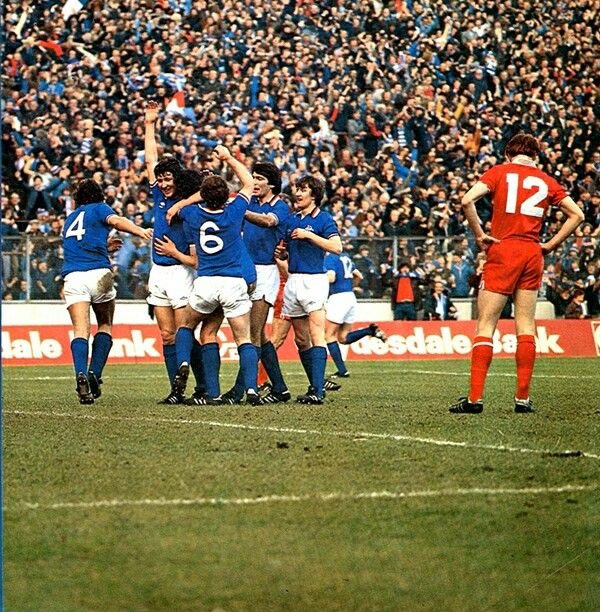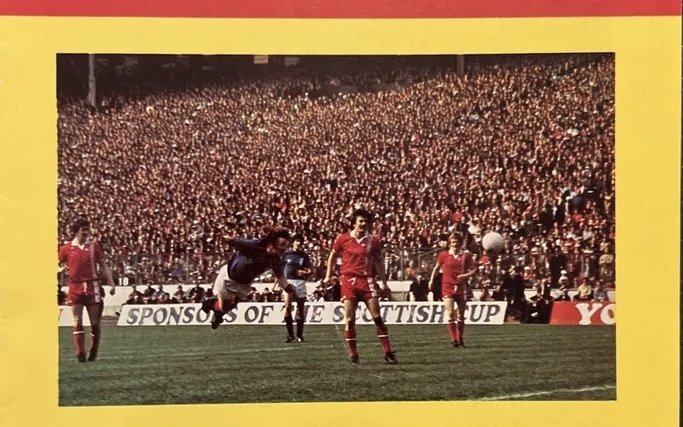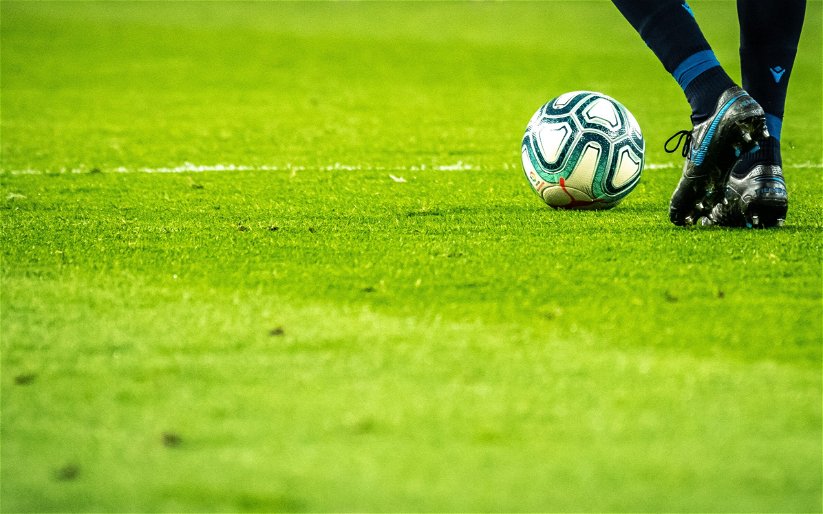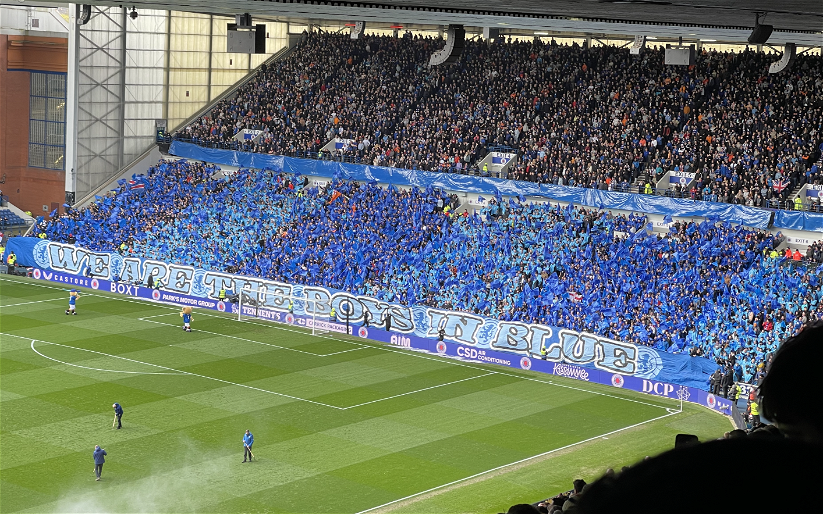By David Herd
Rangers take on Aberdeen this Sunday in the League Cup Final, looking to finally win the trophy for a record 28th time. In those 27 previous winning finals, Aberdeen have been the losing finalists on five occasions, the first being in the inaugural competition in 1946/47. It was over thirty years before the two clubs met again in the final, and it was an occasion that some observers identify as the day when the modern poisonous attitude amongst Aberdeen fans towards Rangers was born. It certainly was a final laced with controversy, and with an unforgettable ending.
 Season 1978/79 represented a sea change at both Rangers and in Scottish football. At Ibrox, Rangers had won a glorious treble the previous season, defeating title runners-up Aberdeen in the Scottish Cup final on May 6th 1978 to clinch a second domestic clean sweep in three seasons. But there followed a summer of massive change. Manager Jock Wallace shocked the support by resigning to take up the manager’s job at Leicester City. Legendary captain John Greig was chosen to step out of the dressing room and into the dugout, ending his incredible seventeen year playing career. Greig inherited an experienced, battle-hardened and winning squad, but also a major problem with Player of the Year Derek Johnstone asking for a transfer. He solved that by awarding the country’s top goalscorer the captaincy, while also agreeing that the new captain would play more often in his favoured role at centre half. There was one other, maybe less significant change. Rangers adopted a new-look home kit for the season, the plain blue round neck shirt design that had first been used in 1968 was replaced by a more modern shirt with a red, white and blue collar and cuffs. It was the first time that the club’s first choice colours would see red on the shirt design.
Season 1978/79 represented a sea change at both Rangers and in Scottish football. At Ibrox, Rangers had won a glorious treble the previous season, defeating title runners-up Aberdeen in the Scottish Cup final on May 6th 1978 to clinch a second domestic clean sweep in three seasons. But there followed a summer of massive change. Manager Jock Wallace shocked the support by resigning to take up the manager’s job at Leicester City. Legendary captain John Greig was chosen to step out of the dressing room and into the dugout, ending his incredible seventeen year playing career. Greig inherited an experienced, battle-hardened and winning squad, but also a major problem with Player of the Year Derek Johnstone asking for a transfer. He solved that by awarding the country’s top goalscorer the captaincy, while also agreeing that the new captain would play more often in his favoured role at centre half. There was one other, maybe less significant change. Rangers adopted a new-look home kit for the season, the plain blue round neck shirt design that had first been used in 1968 was replaced by a more modern shirt with a red, white and blue collar and cuffs. It was the first time that the club’s first choice colours would see red on the shirt design.
Off the pitch, there was another massive change with the start of the rebuilding of Ibrox stadium. Season 1978/79 would see the old terracing at the traditional “Rangers end” bulldozed and the new Copland Road stand being built. Meanwhile, there were huge changes elsewhere. Celtic responded to a miserable fifth place finish by removing Jock Stein from the manager’s office and installing former captain Billy McNeill in his place. McNeill had been Aberdeen boss and had come close to silverware the previous season, so the board at Pittodrie then found themselves seeking a manager. They recruited well, taking Alex Ferguson from St Mirren, a move that would see their club reach heights nobody thought possible in the seasons to come. Jock Stein, meanwhile, decided not to take up Celtic’s offer of a job running their football pools, and after a short and unhappy spell at Leeds United, he became the Scotland national team manager. 1978 was the year when Ally McLeod’s Argentinian nightmare ended forever any tartan dreams of world football glory.
Despite Rangers losing the leadership, the will-to-win and the sheer presence of their previous captain on the pitch, most fans throughout the country still saw them as the team to beat in the new season. Greig’s managerial inexperience wasn’t seen as a particular handicap given his stature in the game and within the club. Like all new seasons, the first domestic silverware that would be on offer was the League Cup.
A feature of the tournament over the years has been the number of different formats it has had, with season 1978/79 being a time where the initial rounds were two-legged matches up until a traditional semi-final and final. In a season blighted by inconsistency, Rangers reached the semi-finals in quite stuttering fashion. Straightforward home and away wins over the minnows of Albion Rovers and Forfar preceded a last 16 tie against St Mirren who were the better team for much of the 180 minutes of football played. They were 2-0 up in the Ibrox first leg as the match entered the last half hour, the home fans showing their displeasure. Then substitute Davie Cooper unleashed an unstoppable 25-yard free kick into the top corner, and suddenly the match swung. Alex Miller scored a fine equaliser before skipper Johnstone grabbed a late winner for a 3-2 first leg lead that felt like robbery. Manager Greig then decided on a defensive operation at Love Street in the return leg, with the home team unable to turn their possession into goals as the goalless draw saw Rangers into the last eight. The genius of Cooper wasn’t called upon that night, the new manager settling into a habit of dropping him in many the toughest matches and preferring steel to silk.
The quarter-final draw was kind, Arbroath defeated home and away, both times in extremely unconvincing wins. As the season reached early December, Greig’s reign had featured two incredible European highs with the defeats of the mighty Juventus and PSV Eindhoven, but the mainly drab League Cup run sat alongside some awful league displays with the team in fourth place after four wins, four defeats and eight draws in the first sixteen league matches. There would then be a pre-Christmas semi-final to be played, and the opposition were Celtic.
They had a win and a draw over Rangers in the league, and were favourites to progress to a 15th straight League Cup final, having appeared in every final since 1964. But in a controversial and bad-tempered midweek match in front of 50,000 at Hampden, Greig’s men came from behind twice to snatch a 3-2 win in extra-time thanks to a comical Jim Casey own goal. Tommy Burns and Alex Miller were sent off, and both sets of fans raged at the referee for differing reasons. Meanwhile, Alex Ferguson’s Aberdeen defeated Hibs 1-0 in extra-time at Dens Park to confirm the same finalists as in the Scottish Cup earlier in the year.
The final wasn’t played for another 3 months, as 54,000 travelled to the national stadium to see if old teammates Ferguson or Greig could win their first major trophy as a manager. Rangers started favourites with the bookies, with the team finally showing some better league form to sit second in the table with games in hand on the morning of the match. John Greig’s first team selection in a major domestic final was this:
Peter McCloy, Sandy Jardine, Ally Dawson, Derek Johnstone, Colin Jackson, Alex MacDonald, Tommy McLean, Bobby Russell, Billy Urquhart, Gordon Smith, Davie Cooper. Subs – Alex Miller, Derek Parlane.
This meant that the only two players missing from starting eleven in the treble triumph over The Dons the previous May were the injured Tom Forsyth and the man sitting in the dugout. Skipper Johnstone played in both, although he had been centre forward in that last big Hampden occasion. Perhaps the inclusion of the summer signing Billy Urquhart instead of the more experienced Derek Parlane was a surprise, although the big highlander had scored both goals in an important win in the league at Love Street the previous midweek. It was a Rangers team packed with winner’s medals and big-game experience.
Aberdeen were just starting to assemble the team who would go on to win a European trophy just four years later, with starting places for future Gothenburg heroes Kennedy, McMaster, Miller, Rougvie and Strachan, plus youngster Alex McLeish on the bench. They also had significant firepower in the shape of Steve Archibald and Joe Harper, and those travelling from the north were in confident mood. Both matches between the sides in the league had been draws, there was a case to be made for either team.
Referee Ian Foote got proceedings underway at 3pm, with the fans destined to watch a first half short on thrills but full of commitment. The two experienced international goalkeepers were largely untroubled, Rangers having the better of possession and chances, but the well-organised Aberdeen defence coping well and coming out on top. Aberdeen’s Drew Jarvie had possibly the best effort of the half as the interval approached, finally forcing a good save from McCloy in a rare Aberdeen attack. It had looked like one of those games where the first goal might be crucial, and it arrived just five minutes after the restart.
The goal was something of a disaster for Peter McCloy. Aberdeen cut through the left side of the Rangers defence, Gordon Strachan running clear into the box and getting to the bye line. His floated cross was met by the head of Duncan Davidson at the far post. McCloy got down well to save it, but the ball squirmed out of his grasp and dribbled over the line. Ferguson jumped for joy on the touchline, and those in red joined in the wild celebrations as they scented a second League Cup triumph in three seasons.
But Rangers refused to lie down. The game then flowed almost entirely towards Bobby Clark in the Aberdeen goal, and as the match entered the final quarter the goalkeeper appeared to hurt his shoulder when he went to catch a cross and dropped the ball. He played on after treatment, in the days when there were only two outfield substitutes on the bench. John Greig threw on the two experienced men on his bench, with Alex Miller replacing Billy Urquhart, meaning Sandy Jardine moving to central defence and Derek Johnstone up front where most fans thought he was best. Davie Cooper was also withdrawn to add a second Derek to the forward line.
The Rangers onslaught continued, with the equaliser finally arriving with just thirteen minutes left. And it was one of the club’s great big-game goalscorers who found the net. Midfield dynamo Alex MacDonald had scored in the 1975 League Cup final, the 1976 Scottish Cup final, and the 1978 Scottish Cup final. He now added a fourth cup final goal to his magnificent CV. He ran on to an Alex Miller pass some 25 yards out, and fired a low, hard drive into the net off the post, out of the reach of Clark. As Doddie ran off to celebrate, Ferguson reacted angrily on the touchline. His mood was to get darker yet.
A few minutes later, centre half Doug Rougvie flattened Johnstone as they challenged together for a high clearance. The Rangers captain lay on the turf, all around him aware of the elbow that had landed him there. Rougvie had already been booked, and his foolish lack of discipline was deservedly punished with a second booking and his dismissal from the field. He became the first player ever sent off in a League Cup final, and just the second in any major national final after Jock Buchanan of Rangers in the 1929 Scottish Cup. Feguson was now apoplectic, furiously pointing towards the referee and to the Rangers skipper. Television pictures were later to be inconclusive on the incident, with Johnstone adamant that Rougvie had deliberately elbowed him, while the Aberdeen man protested he had been wronged. Fair to say that in subsequent years, Rougvie would show himself to be quite capable of assaults on opposing players, so his attempts at angelic innocence were hard to believe.
With the momentum all in their favour, plus the extra man, Rangers went for the kill. Aberdeen replaced Jarvie with young defender Alex McLeish to shore up their back line, in the hope they could survive extra-time and force a replay. They never made it to the extra half hour. In the third minute of injury time, Tommy McLean floated in an inch-perfect free kick from wide on the right, and centre half Colin Jackson rose majestically to bullet an unstoppable header into the corner of the Aberdeen net and win the cup. The club’s longest-serving player became the unlikely matchwinner.
Seconds after the restart, referee Foote blew the final whistle as the Rangers end erupted and the Aberdeen players slumped to the ground. Rangers had given John Greig his first trophy as manager, winning their fourth successive domestic competition. They would also retain the Scottish Cup, but blow the chance of historic back-to-back trebles by surrendering to Celtic at Parkhead in a league decider when they appeared to have the game in control.
As far as the League Cup win was concerned, the sending off incident was to become a massive talking point in the days and weeks to come. Ferguson initially paid credit to Rangers for their fightback, and bemoaned his players for not competing for the full 90 minutes. But his sporting response to bitter defeat didn’t last long. He gave a series of interviews where he accused Johnstone of diving and conning the referee, and of how his team had been unfairly robbed of the trophy. He spoke of “west coast bias” and how Aberdeen were cheated out of a fair chance whenever they came to Glasgow. This accusation towards officials would be a feature of the early years of his Pittodrie reign, no doubt an attempt at creating a siege mentality in both the Aberdeen dressing room and amongst their fans.
Looking back, it was probably a manager who wanted to win at all costs using mind games towards his own players, and towards referees. But it seemed to mark the beginning of a change in attitude at Aberdeen, and in particular towards Rangers. There were many other incidents in the years ahead which further stirred this hostility, but there are many who believe the current hatred demonstrated by supporters of that club towards Rangers FC can be traced back to the League Cup final of March 31st 1979.
On December 17th 2023, the two clubs meet again in the final. There may again be controversy. There will no doubt be plenty animosity. Let’s hope it’s the Rangers fans again celebrating as their captain raises the trophy at full-time.Triumph number 28 is all that matters.




